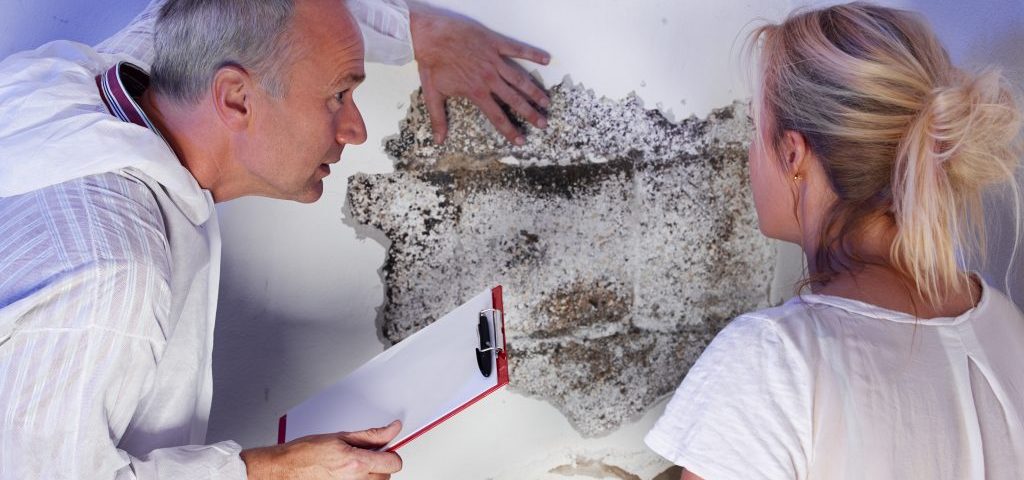- WE’RE HERE TO HELP | SE HABLA ESPAÑOL
- 800.586.5555
When Will Homeowners Insurance Pay for Mold Remediation?
When Will Homeowners Insurance Pay for Mold Remediation?

Florida homes damaged by flooding after a hurricane or tropical storm often face the double whammy of not having any of the water damage covered and then not getting any assistance with mold remediation.
This is true for any water damage that’s caused by a peril the insurance company decides isn’t covered. Consider these situations:
- Your roof leaks and the insurance company denies the claim because the damage was too old or was deemed to be caused by inadequate care and upkeep on your part
- You find a plumbing leak due to poor workmanship of your plumber and find out that “defective workmanship” is an excluded peril in your policy
- A slow leak from a faucet is discovered several months after it started, leading to mold growth in a vanity cabinet
- The insurance company decides your mold could have been prevented had you been using a whole-home dehumidifier or some other type of dehumidifying solution
All of these scenarios are possible, and the insurance company would likely deny any claim you file for mold remediation services that arose as a result of any of those damages.
It really comes down to whether the water damage itself was covered. If your home insurance company agreed to pay your water damage claim, chances are good they will pay at least some of your mold remediation costs.
Was there a fire in your home and the firefighters used water to put out the flames? In Florida, there’s a high probability that mold is going to sprout up as a result of water permeating your home and belongings. As long as the insurance company covers the fire damage repairs, they will likely cover mold remediation as well.
Will the Insurance Company Pay the Full Price of Mold Remediation?
Many insurance providers have enacted polices that limit mold remediation claim payments to between $1,000 and $10,000. It’s not unheard of for mold remediation jobs to get in the $15,000 to $30,000 range, especially when the mold is widespread. Some homeowners may still end up paying quite a bit of money out of pocket for mold repairs, even if their insurance company approved their claim.
When You File a Mold Claim
In some cases, the insurance company may send out mold remediation specialists from the start of the repair process for a water damage claim once it is approved. If you have a covered plumbing leak, for example, your insurer is going to assume the professional drying and mold remediation efforts will be necessary before any additional repairs – like floor or drywall replacements – can truly commence in earnest.
Mold remediation companies often utilize the highest quality air movers and dehumidifiers for the specific purpose of completely drying out flooded areas. Florida, along with our other Gulf Coast neighbors, have what are probably the most experienced mold remediation professionals in the United States.
If anyone knows how to adequately dry a home or business that’s suffered water damage, it’s the mold remediation professionals in Florida.
What to Do If You Discover Mold
- Stop any water leakage that may be contributing to the mold growth
- Take pictures of the mold and water damage
- Call your insurance company to get the claims process started as soon as possible
- Start trying to dry out the area by running a dehumidifier, opening windows or moving air over the moist area
- DON’T try to clean or remove the mold on your own – a claims adjuster may need to inspect the mold damage themselves to determine whether or not your claim will be honored
- Call your agent if you have one or begin reviewing your homeowners insurance policy yourself to determine whether your mold should be covered
Make sure to ask your insurance agent or the claims adjuster if there are policy limits on mold remediation. If you only end up having $5,000 available from your claim you should plan accordingly when consulting with mold remediation companies.
Mold can be dangerous, especially for people with mold allergies, asthma or other breathing conditions. When possible, it’s always best to let qualified professionals with the proper equipment handle mold removal and remediation.
What You Can Do to Prevent Mold
The following suggestions can help prevent the source of mold, primarily unnoticed moisture or leaks, from accumulating. Overlooked long-term leaks are especially important to avoid because those are the types of claims that are frequently denied by insurance companies, in which case they won’t be paying for mold remediation either.
- Get in the habit of looking in cabinets under sinks frequently to check for moisture
- Check behind washing machines, near water heaters or any other appliances that are attached to water for leaks
- Replace carpet and other mold-prone flooring materials in bathrooms or other rooms of your home where moisture is frequently present
- Make sure the exhaust fans in your kitchen and bathrooms are working
- Use your air conditioning or home humidifier to keep your home’s moisture in the 30 to 60 percent range
Has Your Mold Claim Been Denied?
Mold claim denial is often coupled with some other type of claim denial, which is why you may seriously want to consider speaking with an public adjuster or property damage lawyer.
Not every claim can be easily challenged, but if you believe the insurance company is mistaken in their decision, such as wrongly estimating repair costs or mischaracterizing the source of the damage, it may be worth your time to fight their decision with professional assistance from an public claims adjuster or property damage lawyer.
